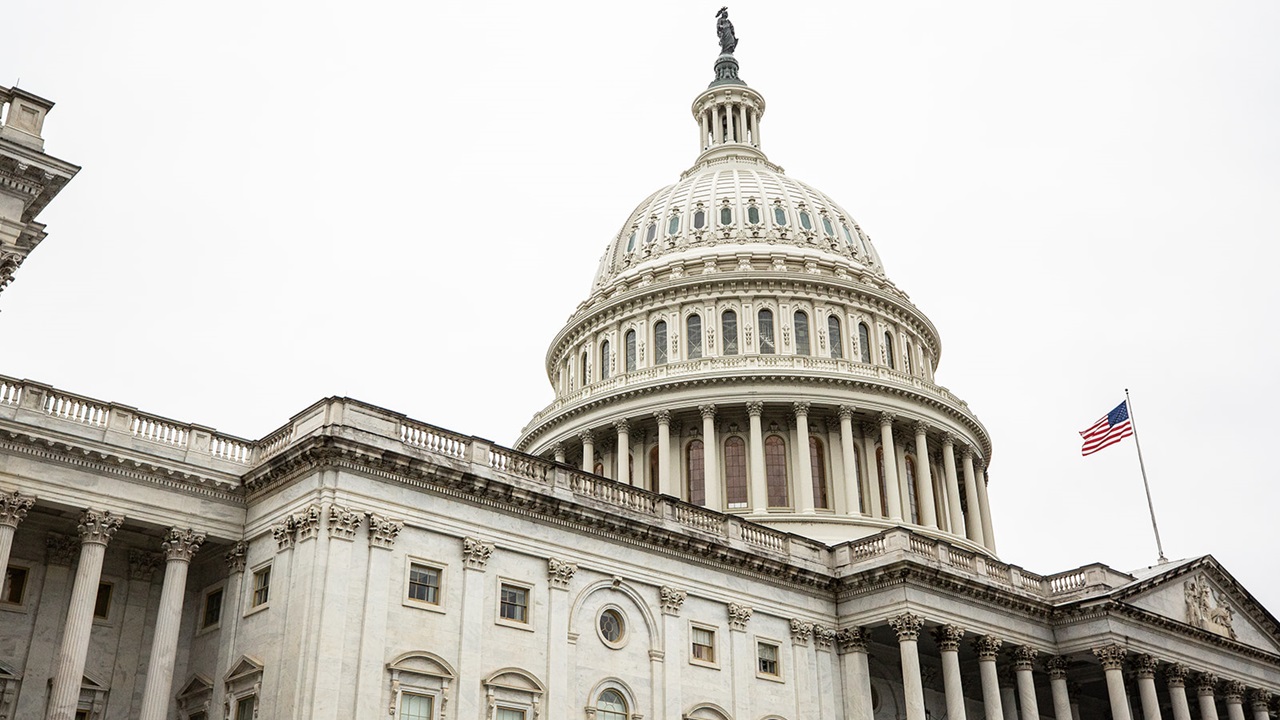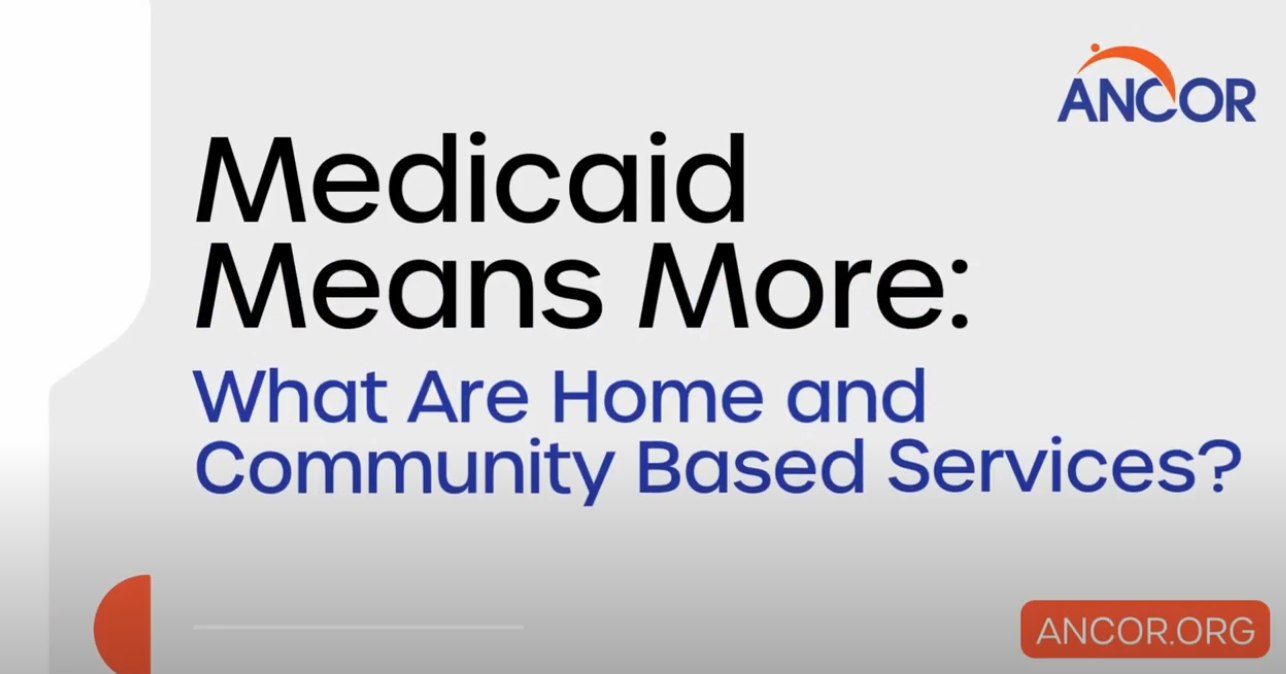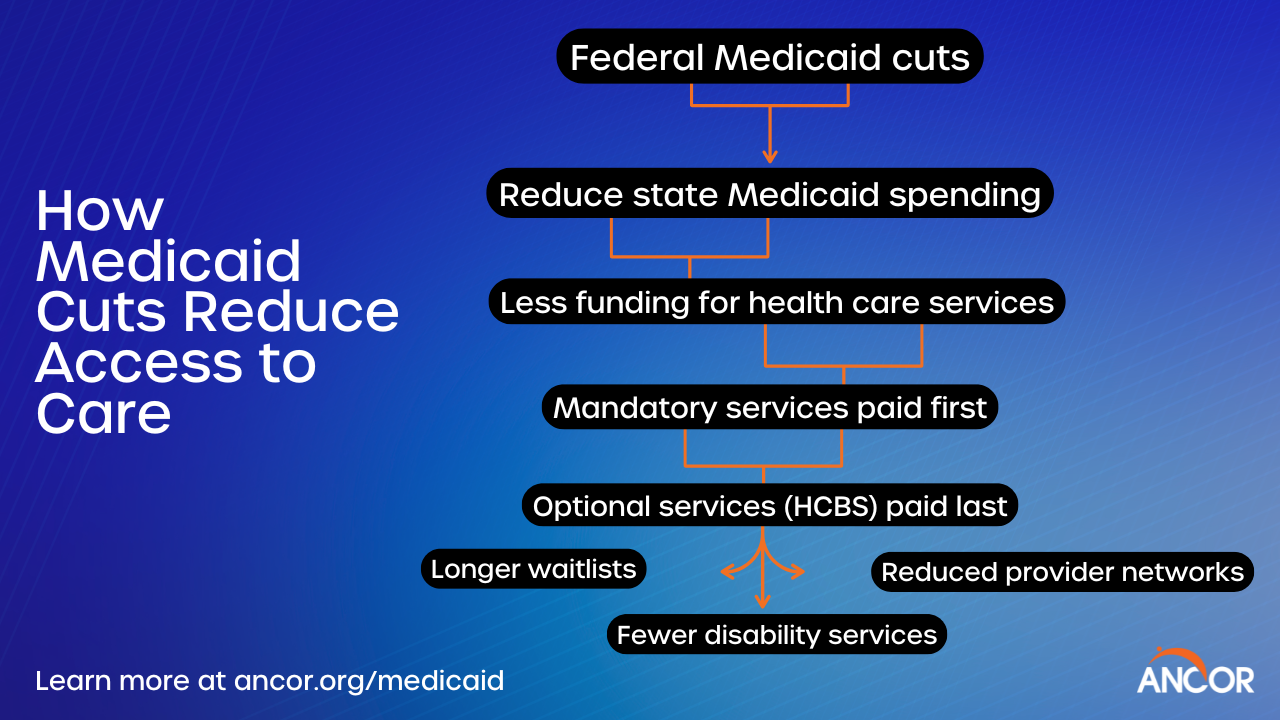Medicaid Resource Center

The Latest on the Budget Reconciliation Bill, H.R. 1
Summary of Medicaid Provisions in H.R. 1
On July 4, 2025, the budget reconciliation bill, H.R. 1, was signed into law, making cuts of almost $1T to Medicaid funding. Below is a summary of key provisions impacting the Medicaid program.
Budget Reconciliation & Disability Services
The budget reconciliation bill that passed contains language that will have an impact on people with disabilities and disability services.
OBBBA Medicaid Policy Timeline
This resource from NAMD outlines key Medicaid policy changes in OBBBA with the greatest operational impact and upcoming deadlines for state and territory agencies.
Distributional Effects of Public Law 119-21
Congressional Budget Office report on the distributional effects of the reconciliation bill.
Changes to State Financing Mechanisms
Impacts of Medicaid Cuts
People with I/DD, their families, community providers and state lawmakers will all be impacted by state cuts to community-based services due to federal Medicaid funding reductions.
Fact Sheet: Changes in State Financing Mechanisms for Medicaid Programs
The budget reconciliation bill signed into law on July 4, 2025 makes changes to two important state funding mechanisms: provider taxes and state-directed payments.
State-Specific Template: Changes to State Financing Mechanisms for Medicaid Programs
Use this customizable template to share with lawmakers and policymakers how your state will be impacted by changes to state financing mechanisms for Medicaid programs.
2025 State Special Session Tracker
2025 Special Session tracker by state, maintained by the Center for Budget and Policy Priorities.
Rural Health Transformation Program
Rural Health Transformation Program: CMS Funding Awards Announcement
CMS announced funding awards for the Rural Health Transformation Program (RHTP) on December 29, 2025.
Rural Health Transformation Program: State Project Abstracts
CMS released a compilation of the RHTP project abstracts submitted by states with their applications. Each project abstract provides a one-page summary of each state’s proposed projects, including the purposes and anticipated outcomes.
Rural Health Transformation Program: Frequently Asked Questions
The Rural Health Transformation Program (RHTP) was created by the budget reconciliation legislation signed into law on July 4, 2025 and aims to help rural communities across America in improve healthcare access, quality, and outcomes.
Rural Health Transformation Program: Template for Engaging State Policymakers
ANCOR developed this resource to facilitate your discussions with state policymakers on specific ways that RHTP funding can be used to support community-based programs for people with intellectual and developmental disabilities in rural areas.
Tracking State Preparation for the Rural Health Transformation Program
This resource from State Health & Value Strategies provides an interactive map that tracks state activities related to applications for RHTP funding.
Fact Sheet: Community-Based Services & the Rural Health Transformation (RHT) Program
The One Big Beautiful Bill Act (OBBBA) established the Rural Health Transformation Program.
RHT Program Overview & Timeline
CMS has provided instructions for states on how to apply for RHT Program funding via a Notice of Funding Opportunity that will be available in mid-September 2025.
ANCOR Statements & Letters

Statement on Final Passage of the Republican Reconciliation Package
The U.S. House of Representatives voted to pass the FY 25 budget reconciliation bill, legislation that will make deep cuts to Medicaid and inflict harm on people with disabilities and the network of community-based supports they depend on.

Statement to Senate HELP Committee
ANCOR urges the U.S. Senate Committee on Health, Education, Labor, and Pensions to support policies to invest in Medicaid-funded services for people with I/DD.
ANCOR Fact Sheets
FAQs: Medicaid Cuts & Community Services
Get the answers to some of the questions we hear most frequently regarding how cuts to Medicaid will harm disability services.
Cuts to Medicaid Harm Disability Services
Federal Medicaid cuts shift costs to states and harm disability services, forcing people with I/DD to struggle to meet their most basic needs.
Community-Based Services for People with I/DD
These critical services help people with I/DD to live full and independent lives in their communities, but access is at risk.
America's Direct Support Workforce Crisis
A longstanding shortage of direct support professionals has led to closures of critically needed services and a denial of access to community.
Medicaid Work Requirements & People with Disabilities
Medicaid work requirements not only waste millions of dollars on expensive tracking systems and overhead costs, but they are extremely burdensome for beneficiaries to navigate and for states to administer.
Expert Analysis
Tracking Health Provisions in the 2025 Federal Budget Reconciliation Bill
This summary describes the health care provisions in the law (described as the Senate-passed bill) in four categories: Medicaid, the Affordable Care Act, Medicare and Health Savings Accounts (HSAs).
Allocating CBO’s Estimates of Federal Medicaid Spending Reductions Across the States: Senate Reconciliation Bill
[From KFF] The Congressional Budget Office’s (CBO) latest cost estimate shows that the Senate bill would reduce federal Medicaid spending by $1 trillion and increase the number of uninsured people by 11.8 million.
State Medicaid Fact Sheets
[From KFF] State Medicaid fact sheets provide a snapshot with key data for Medicaid in every state related to current coverage, access and financing, as well as a politics section for each state.
U.S. Medicaid Enrollment by Congressional District
[From Association for Community Affiliated Plans] Understanding the number of Medicaid beneficiaries by congressional district across the United States.
Waste, Fraud & Abuse in Medicaid
[From Georgetown University] Analysis by the McCourt School of Public Policy illustrates why claims of widespread waste, fraud and abuse in Medicaid are simply false.
History Repeats? Faced With Medicaid Cuts, States Reduced Support For Older Adults And Disabled People
[From Health Affairs] Medicaid cuts, if enacted, will have devastating effects on the most vulnerable populations who will experience loss of coverage, cuts to their benefits, and lower quality of care.
Medicaid's Impact on Health Care Access, Outcomes & State Economies
[From Robert Wood Johnson Foundation] Medicaid plays an enormous role in state economies as the single largest source of federal funding to almost every state, comprising two-thirds of all federal grants to states on average.
National & State Progress Towards Shifting Away From Institutional Care
[From Mathematica] National LTSS expenditures totaled $199.4 billion in FY 2020, with HCBS accounting for $124.6 billion and institutional services accounting for $74.8 billion.
Direct Care Workers in the United States: Key Facts 2024
[From PHI] Community providers, funded through Medicaid, are a top driver of job creation with the direct care workforce being the fastest-growing profession over the next decade.
The Role of Disability Service Providers in the New York State Economy
[From Rockefeller Institute] A recent study of disability services in New York found that the economic impact of those services alone was double the investment made by the state into those services.
1915(c) HCBS Waiver Payments and Financing Trends
[From CMS] Investments in HCBS have produced long-term savings by enabling more individuals to be supported in less-costly settings by a margin of about 3:1.
Graphics & Videos

Intro to I/DD Services
All the basics about home- and community-based services in just two minutes.

Medicaid Supports Extraordinary People to Do Ordinary Things
The truth about the impact and necessity of Medicaid, from those who would know.

How Medicaid Cuts Reduce Access to Care
The billions of dollars in proposed #Medicaid cuts in the House and Senate budget reconciliation bills will massively cut federal funding to states.

#SaveMedicaid Social Media Toolkit
Sample social media posts to support you in advocating for Medicaid community-based services.
